强调句
从句中的强调句型

从句中的强调句型
强调句是一种修辞手法,用于突出某个句子成分,使其更具强调性和重要性。
下面是关于强调句型的一些介绍:
- 强调句的构成:“It is/was +被强调的成分+ that +其它成分”。
- “被强调的成分”通常是句子的主语、宾语、状语,特殊情况下也可能是宾语补足语、表语等成分。
- “被强调的成分”通常不能是表语、谓语动词、though/although引导的让步状语从句或whereas引导的从属分句等。
但是,如果当系动词不是be,且表语部分是名词性词组时,强调句也可以强调表语。
- “被强调的成分”是原因状语从句时,只能强调由because引导,而不能强调由since/as/why 等引导的原因状语从句。
- 如果强调动作,“被强调的成分”也可以是动词的非谓语形式。
- 强调句中that的用法:“被强调的成分”不论是时间状语还是地点状语,只能用that,而不能用when, where;“被强调的成分”如果是表示人的名词作主语或宾语时,常用who 或whom代替that;“被强调的句子成分”如果是时间状语、地点状语、直接宾语或间接宾语时,that可省略。
- 强调句中的主谓一致:“被强调的成分”如果是人称代词作主语时,通常用主格代词,但在口语中也常常使用宾格形式,但要注意人称和数的一致。
在使用强调句型时,需要注意句子的结构和语义,以确保强调的内容清晰明了,并且符合语言习惯。
英语中强调句

英语中强调句1. 哇塞,你知道英语中强调句有多神奇吗?就像给句子加了个魔法棒一样!比如“I do love you.”,这里的“do”就是强调啊,强调我是真的爱你呀!2. 嘿,英语中的强调句啊,那可真是个厉害的家伙!就好比在一群人中,一下子就突出了那个最重要的人。
像“She does speak English well.”,这“does”就让人一下子注意到她英语说得好呢!3. 哎呀呀,想想英语强调句,不就像一束聚光灯打在句子上嘛!“It is you that I miss.”,哇,就是强调我想念的是你呀!4. 哇哦,英语强调句,这可是让句子变得超有力量的法宝呀!“He did come here yesterday.”,这“did”就让人清楚知道他昨天确实来了。
5. 嘿哟,英语中的强调句,就如同给句子穿上了闪亮的铠甲!“It was in the park that we met.”,强调就是在那个公园我们遇见的呀!6. 哈哈,英语强调句多有意思呀,简直是句子的魔法点缀!“They do have a lot of fun.”,“do”强调他们真的玩得很开心呢!7. 哟呵,英语强调句,那可是让平淡句子变得超精彩的绝招!“What I really need is this book.”,强调我真正需要的就是这本书呀!8. 哇啦哇啦,英语强调句,不就是让句子变得更突出的神器嘛!“Itis the dog that bit me.”,强调就是这只狗咬了我呀!9. 嘿嘿,英语强调句呀,就像给句子加了个大喇叭!“He will never forget this.”,强调他永远不会忘记这个。
10. 哎呀,英语强调句,那可是句子的魅力加分项呢!“Only you can do it.”,强调只有你能做呀!我的观点结论:英语强调句真的太有趣太有用啦,可以让我们的表达更有力度和情感,大家一定要好好掌握呀!。
强调句的用法
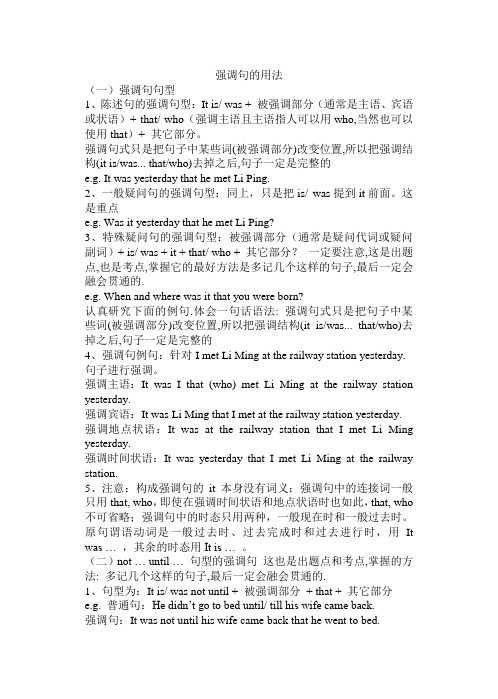
强调句的用法(一)强调句句型1、陈述句的强调句型:It is/ was + 被强调部分(通常是主语、宾语或状语)+ that/ who(强调主语且主语指人可以用who,当然也可以使用that)+ 其它部分。
强调句式只是把句子中某些词(被强调部分)改变位置,所以把强调结构(it is/was... that/who)去掉之后,句子一定是完整的e.g. It was yesterday that he met Li Ping.2、一般疑问句的强调句型:同上,只是把is/ was提到it前面。
这是重点e.g. Was it yesterday that he met Li Ping?3、特殊疑问句的强调句型:被强调部分(通常是疑问代词或疑问副词)+ is/ was + it + that/ who + 其它部分?一定要注意,这是出题点,也是考点,掌握它的最好方法是多记几个这样的句子,最后一定会融会贯通的.e.g. When and where was it that you were born?认真研究下面的例句.体会一句话语法: 强调句式只是把句子中某些词(被强调部分)改变位置,所以把强调结构(it is/was... that/who)去掉之后,句子一定是完整的4、强调句例句:针对I met Li Ming at the railway station yesterday. 句子进行强调。
强调主语:It was I that (who) met Li Ming at the railway station yesterday.强调宾语:It was Li Ming that I met at the railway station yesterday. 强调地点状语:It was at the railway station that I met Li Ming yesterday.强调时间状语:It was yesterday that I met Li Ming at the railway station.5、注意:构成强调句的it本身没有词义;强调句中的连接词一般只用that, who,即使在强调时间状语和地点状语时也如此,that, who 不可省略;强调句中的时态只用两种,一般现在时和一般过去时。
强调句强调主语
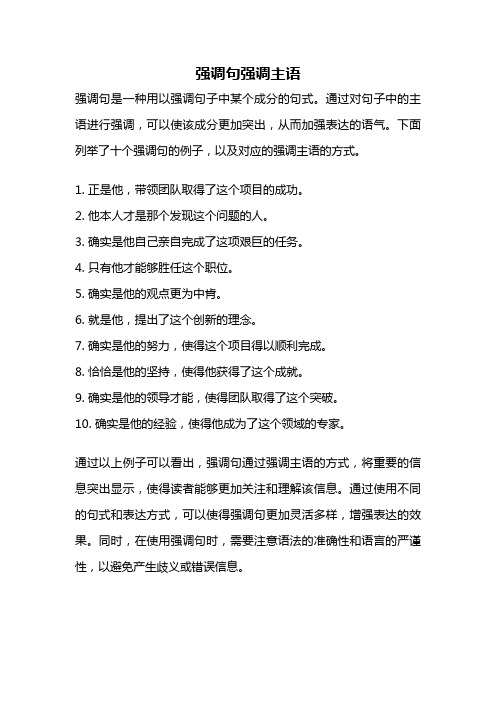
强调句强调主语
强调句是一种用以强调句子中某个成分的句式。
通过对句子中的主语进行强调,可以使该成分更加突出,从而加强表达的语气。
下面列举了十个强调句的例子,以及对应的强调主语的方式。
1. 正是他,带领团队取得了这个项目的成功。
2. 他本人才是那个发现这个问题的人。
3. 确实是他自己亲自完成了这项艰巨的任务。
4. 只有他才能够胜任这个职位。
5. 确实是他的观点更为中肯。
6. 就是他,提出了这个创新的理念。
7. 确实是他的努力,使得这个项目得以顺利完成。
8. 恰恰是他的坚持,使得他获得了这个成就。
9. 确实是他的领导才能,使得团队取得了这个突破。
10. 确实是他的经验,使得他成为了这个领域的专家。
通过以上例子可以看出,强调句通过强调主语的方式,将重要的信息突出显示,使得读者能够更加关注和理解该信息。
通过使用不同的句式和表达方式,可以使得强调句更加灵活多样,增强表达的效果。
同时,在使用强调句时,需要注意语法的准确性和语言的严谨性,以避免产生歧义或错误信息。
英语语法大全:强调句
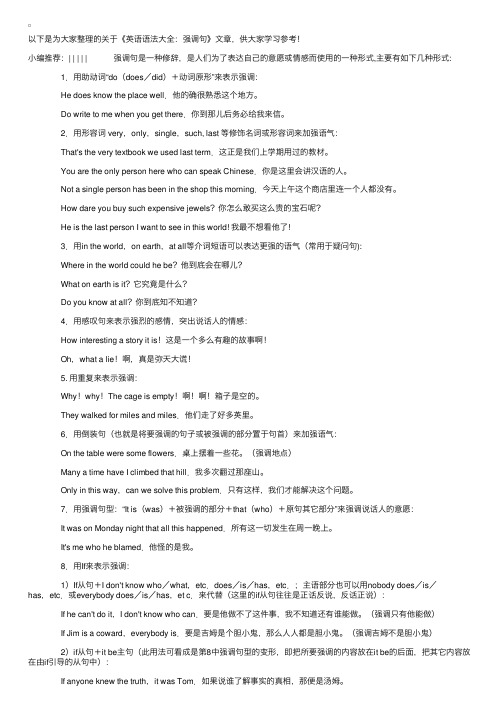
以下是为⼤家整理的关于《英语语法⼤全:强调句》⽂章,供⼤家学习参考!⼩编推荐:| | | | | 强调句是⼀种修辞,是⼈们为了表达⾃⼰的意愿或情感⽽使⽤的⼀种形式,主要有如下⼏种形式: 1.⽤助动词“do(does/did)+动词原形”来表⽰强调: He does know the place well.他的确很熟悉这个地⽅。
Do write to me when you get there.你到那⼉后务必给我来信。
2.⽤形容词 very,only,single,such, last 等修饰名词或形容词来加强语⽓: That's the very textbook we used last term.这正是我们上学期⽤过的教材。
You are the only person here who can speak Chinese.你是这⾥会讲汉语的⼈。
Not a single person has been in the shop this morning.今天上午这个商店⾥连⼀个⼈都没有。
How dare you buy such expensive jewels?你怎么敢买这么贵的宝⽯呢? He is the last person I want to see in this world! 我最不想看他了! 3.⽤in the world,on earth,at all等介词短语可以表达更强的语⽓(常⽤于疑问句): Where in the world could he be?他到底会在哪⼉? What on earth is it?它究竟是什么? Do you know at all?你到底知不知道? 4.⽤感叹句来表⽰强烈的感情,突出说话⼈的情感: How interesting a story it is!这是⼀个多么有趣的故事啊! Oh,what a lie!啊,真是弥天⼤谎! 5. ⽤重复来表⽰强调: Why!why!The cage is empty!啊!啊!箱⼦是空的。
英语强调句型
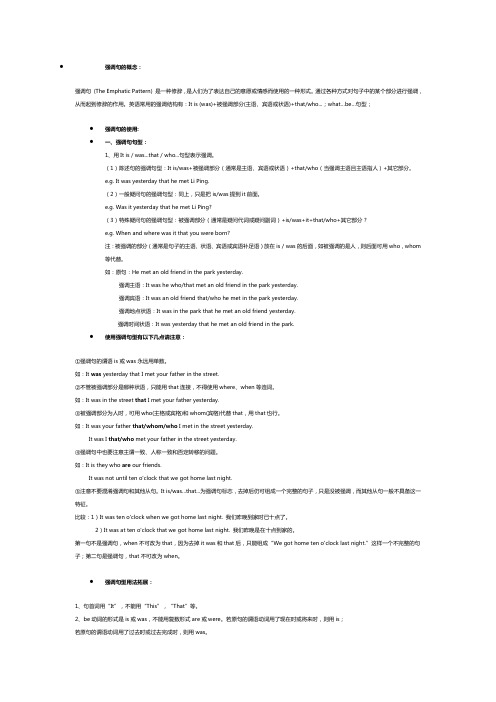
∙强调句的概念:强调句(The Emphatic Pattern) 是一种修辞,是人们为了表达自己的意愿或情感而使用的一种形式。
通过各种方式对句子中的某个部分进行强调,从而起到修辞的作用。
英语常用的强调结构有:It is (was)+被强调部分(主语、宾语或状语)+that/who...;what…be…句型;∙强调句的使用:∙一、强调句句型:1、用It is/was...that/who...句型表示强调。
(1)陈述句的强调句型:It is/was+被强调部分(通常是主语、宾语或状语)+that/who(当强调主语且主语指人)+其它部分。
e.g. It was yesterday that he met Li Ping.(2)一般疑问句的强调句型:同上,只是把is/was提到it前面。
e.g. Was it yesterday that he met Li Ping?(3)特殊疑问句的强调句型:被强调部分(通常是疑问代词或疑问副词)+is/was+it+that/who+其它部分?e.g. When and where was it that you were born?注:被强调的部分(通常是句子的主语、状语、宾语或宾语补足语)放在is/was的后面,如被强调的是人,则后面可用who,whom等代替。
如:原句:He met an old friend in the park yesterday.强调主语:It was he who/that met an old friend in the park yesterday.强调宾语:It was an old friend that/who he met in the park yesterday.强调地点状语:It was in the park that he met an old friend yesterday.强调时间状语:It was yesterday that he met an old friend in the park.∙使用强调句型有以下几点请注意:①强调句的谓语is或was永远用单数。
强调句句型

强调句句型研究必备欢迎下载一、强调句(一)强调句句型1、陈述句的强调句型:It is/ was +被强调部分(通常是主语、宾语或状语)+ that/ who(当强调主语且主语指人)+其它部分。
e.g. It was yesterday that he met Li Ping.2、一般疑问句的强调句型:同上,只是把is/ was提到it 前面。
e.g. Was it yesterday that he met Li Ping?3、特殊疑问句的强调句型:被强调部分(通常是疑问代词或疑问副词)+ is/ was + it + that/ who +其它部分?e.g. When and where was it that you were born?4、强调句例句:针对I met Li Ming at the railway station yesterday.句子进行强调。
强调主语:It was I that (who) met Li Ming at the railway station yesterday.强调宾语:It was Li Ming that I met at the railway station yesterday.夸大地址状语:It was at the railway station that I met Li Ming yesterday.夸大工夫状语:It was yesterday that I met Li Ming at the railway station.5、留意:组成夸大句的it自己没有词义;夸大句中的毗连词通俗只用that, who,纵然在夸大工夫状语和地址状语时也云云,that, who不成省略;夸大句中的时态只用两种,通俗现在时和通俗曩昔时。
原句谓语动词是通俗曩昔时、曩昔完成时和过去进行时,用It was …,其余的时态用It is …。
(二)not … until …句型的强调句1、句型为:It is/ was not until +被强调部分+ that +其它部分e.g.通俗句:He didn’t go to bed until/ till his wife came back.强调句:It was not until his wife came back that he went to bed.2、注意:此句型只用until,不用till。
强调句型

强调句型强调句中某一成分的句子叫做强调句。
强调句型主要有以下三种:1. It is (was)+被强调的部分+that 从句这是强调句型的常见结构。
被强调的部分通常为主语、宾语和状语。
翻译时被强调部分翻译成“是”、“正是”、“就是”等。
【It is professor Li that (who) sent me the letter .给我寄信的是李教授。
(主语)【It was Doctor James that (which) they talked about last week .她们上周讨论的就是这部小说。
(宾语)【It is only when one is ill that one knows the values of health.人们生病了才知道健康的价值。
(状语)2. 主语+do(does,did)+动词+其她部分如果句子没有助动词,在陈述句中的谓语动词前加do表示强调,通常用于一般过去四化中,也可用于祈使句中。
如:【You are quite wrong —she does like you .你大错特错——她的确喜欢你。
【In the past ,some people did think that the earth was square .从前,有些人的确认为地球是方的。
【Do send them electronic elements today .务必今天把这些电子器件送给她们。
3. What 引导的名词从句+is (was) +其她成分这一句型只要用来强调主语或宾语。
如:【What impressed me most was her image .给我印象最深的是她的形象。
【What I like is his writing style .我喜欢的是她的写作风格。
英语 强调句
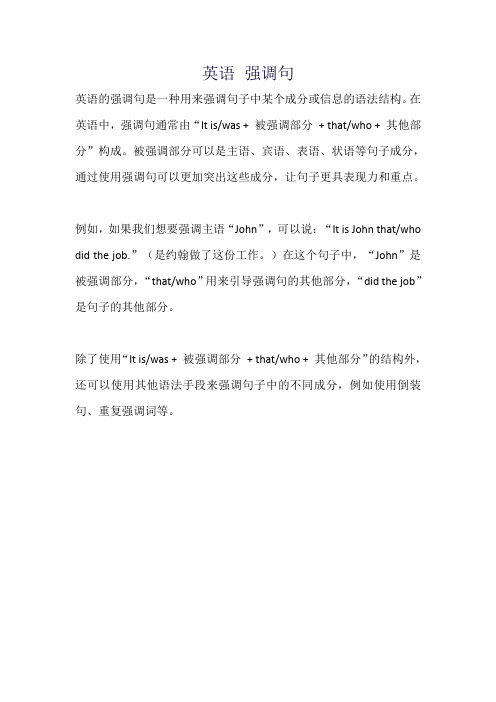
英语强调句
英语的强调句是一种用来强调句子中某个成分或信息的语法结构。
在英语中,强调句通常由“It is/was + 被强调部分+ that/who + 其他部分”构成。
被强调部分可以是主语、宾语、表语、状语等句子成分,通过使用强调句可以更加突出这些成分,让句子更具表现力和重点。
例如,如果我们想要强调主语“John”,可以说:“It is John that/who did the job.”(是约翰做了这份工作。
)在这个句子中,“John”是被强调部分,“that/who”用来引导强调句的其他部分,“did the job”是句子的其他部分。
除了使用“It is/was + 被强调部分+ that/who + 其他部分”的结构外,还可以使用其他语法手段来强调句子中的不同成分,例如使用倒装句、重复强调词等。
强调句的结构与强调部分

强调句的结构与强调部分强调句是英语中一个重要的语法结构,用于突出某个信息,使其在句子中更加突出和强调。
强调句的结构较为简单,通常由"It is"或"There is/are"引导,接着是强调部分,最后再加上一个动词原形或过去分词。
本文将详细探讨强调句的结构和强调部分的使用。
一、强调句的结构强调句的基本结构为:“It is + 被强调部分+ that/who + (do)”,其中"It is"为固定词组,后跟被强调部分和连接词"that/who",最后再加上一个动词原形或过去分词。
需要注意的是,在强调句中,动词“do”可选用,视具体情况而定,用以表示动作是否已经完成。
例如:1. It is he who broke the window.(是他打破了窗户。
)2. It is smoking that harms your health.(是吸烟对你的健康有害。
)此外,还有一种形式是以"There is/are"引导强调句,结构为:"There is/are + 被强调部分 + that/who + (does)"。
例如:1. There is a book that I want to recommend to you.(有一本书是我想推荐给你的。
)2. There are many people who have been affected by the pandemic.(有很多人受到了疫情的影响。
)二、强调部分的使用在强调句中,被强调部分通常是一个名词、代词或从句。
被强调部分的作用是将注意力集中在该部分,并使其在句子中更加突出。
1. 强调名词强调名词时,通常在强调句中采用"It is + 名词 + that/who"的结构,以强调名词的重要性或特殊性。
例如:1. It is knowledge that makes us powerful.(知识使我们变得强大。
强调句句型
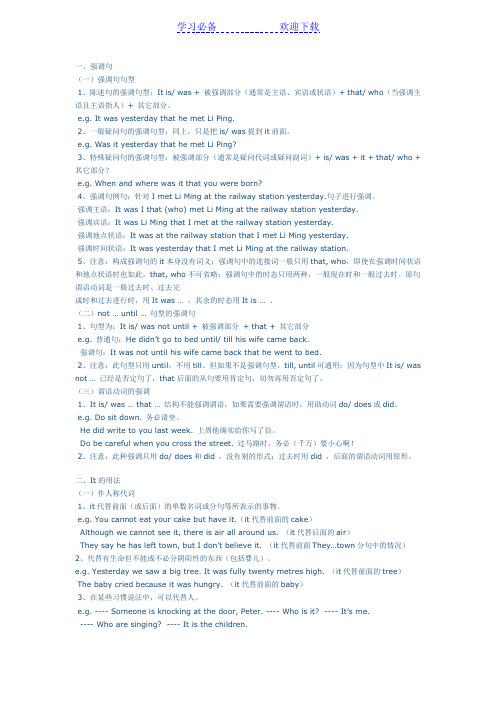
一、强调句(一)强调句句型1、陈述句的强调句型:It is/ was + 被强调部分(通常是主语、宾语或状语)+ that/ who(当强调主语且主语指人)+ 其它部分。
e.g. It was yesterday that he met Li Ping.2、一般疑问句的强调句型:同上,只是把is/ was提到it前面。
e.g. Was it yesterday that he met Li Ping?3、特殊疑问句的强调句型:被强调部分(通常是疑问代词或疑问副词)+ is/ was + it + that/ who + 其它部分?e.g. When and where was it that you were born?4、强调句例句:针对I met Li Ming at the railway station yesterday.句子进行强调。
强调主语:It was I that (who) met Li Ming at the railway station yesterday.强调宾语:It was Li Ming that I met at the railway station yesterday.强调地点状语:It was at the railway station that I met Li Ming yesterday.强调时间状语:It was yesterday that I met Li Ming at the railway station.5、注意:构成强调句的it本身没有词义;强调句中的连接词一般只用that, who,即使在强调时间状语和地点状语时也如此,that, who不可省略;强调句中的时态只用两种,一般现在时和一般过去时。
原句谓语动词是一般过去时、过去完成时和过去进行时,用It was … ,其余的时态用It is … 。
(二)not … until … 句型的强调句1、句型为:It is/ was not until + 被强调部分+ that + 其它部分e.g. 普通句:He didn’t go to bed until/ till his wife came back.强调句:It was not until his wife came back that he went to bed.2、注意:此句型只用until,不用till。
强调句例句
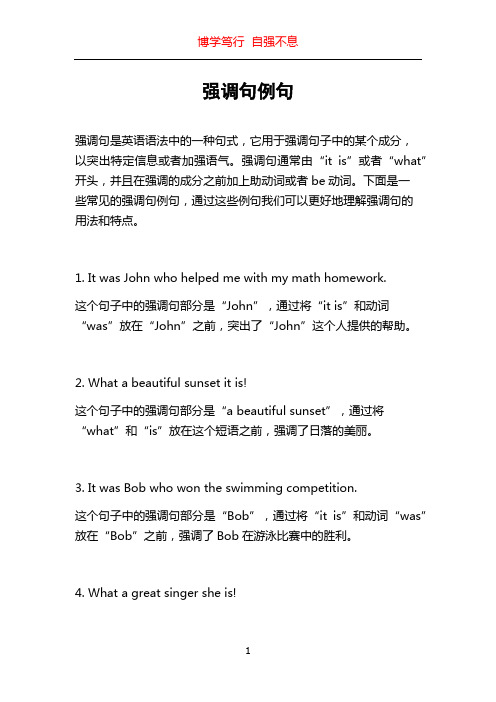
强调句例句强调句是英语语法中的一种句式,它用于强调句子中的某个成分,以突出特定信息或者加强语气。
强调句通常由“it is”或者“what”开头,并且在强调的成分之前加上助动词或者be动词。
下面是一些常见的强调句例句,通过这些例句我们可以更好地理解强调句的用法和特点。
1. It was John who helped me with my math homework.这个句子中的强调句部分是“John”,通过将“it is”和动词“was”放在“John”之前,突出了“John”这个人提供的帮助。
2. What a beautiful sunset it is!这个句子中的强调句部分是“a beautiful sunset”,通过将“what”和“is”放在这个短语之前,强调了日落的美丽。
3. It was Bob who won the swimming competition.这个句子中的强调句部分是“Bob”,通过将“it is”和动词“was”放在“Bob”之前,强调了Bob在游泳比赛中的胜利。
4. What a great singer she is!这个句子中的强调句部分是“a great singer”,通过将“what”和“is”放在这个短语之前,突出了她是一位优秀的歌手。
5. It was the manager who made the final decision.这个句子中的强调句部分是“the manager”,通过将“it is”和动词“was”放在“the manager”之前,强调了经理做出了最终的决定。
6. What a delicious cake it is!这个句子中的强调句部分是“a delicious cake”,通过将“what”和“is”放在这个短语之前,强调了这个蛋糕的美味。
7. It was Mary who found the missing keys.这个句子中的强调句部分是“Mary”,通过将“it is”和动词“was”放在“Mary”之前,强调了Mary找到了丢失的钥匙。
语法之强调句型大总结
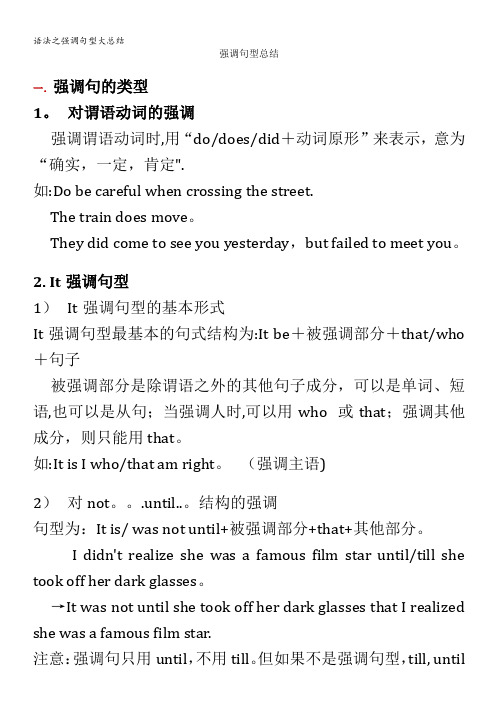
强调句型总结一.强调句的类型1。
对谓语动词的强调强调谓语动词时,用“do/does/did+动词原形”来表示,意为“确实,一定,肯定".如:Do be careful when crossing the street.The train does move。
They did come to see you yesterday,but failed to meet you。
2. It强调句型1)It强调句型的基本形式It强调句型最基本的句式结构为:It be+被强调部分+that/who +句子被强调部分是除谓语之外的其他句子成分,可以是单词、短语,也可以是从句;当强调人时,可以用who 或that;强调其他成分,则只能用that。
如:It is I who/that am right。
(强调主语)2)对not。
.until..。
结构的强调句型为:It is/ was not until+被强调部分+that+其他部分。
I didn't realize she was a famous film star until/till she took off her dark glasses。
→It was not until she took off her dark glasses that I realized she was a famous film star.注意:强调句只用until,不用till。
但如果不是强调句型,till, until可通用;因为句型中It is / was not .。
. 已经是否定句了,that后面的从句要用肯定句,切勿再用否定句了。
3. 强调句的一般疑问句和特殊疑问句(1) 强调句的一般疑问句的基本句型为:Be+it+被强调部分+that/who+句子其他成分如:Is it Professor Wang who teaches you English?(2)强调句的特殊疑问句的基本句型为:特殊疑问词+be+it+that/who/whom+句子其他成分如:What is it that you want me to do?注意:强调句的特殊疑问句用于名词性从句中,要用陈述语序。
强调句掌握强调句的结构和用法
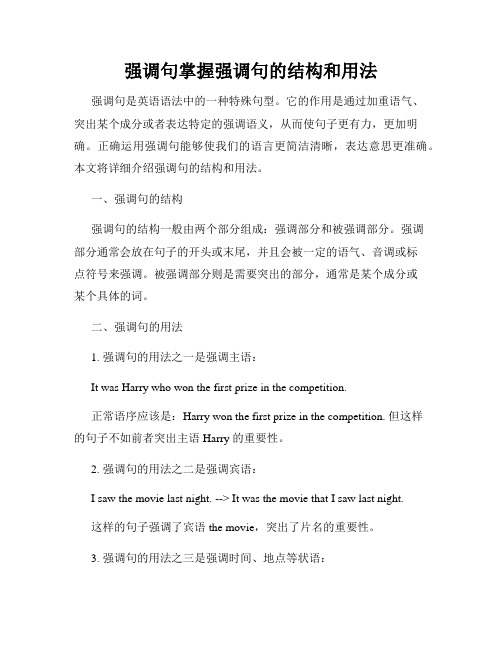
强调句掌握强调句的结构和用法强调句是英语语法中的一种特殊句型。
它的作用是通过加重语气、突出某个成分或者表达特定的强调语义,从而使句子更有力,更加明确。
正确运用强调句能够使我们的语言更简洁清晰,表达意思更准确。
本文将详细介绍强调句的结构和用法。
一、强调句的结构强调句的结构一般由两个部分组成:强调部分和被强调部分。
强调部分通常会放在句子的开头或末尾,并且会被一定的语气、音调或标点符号来强调。
被强调部分则是需要突出的部分,通常是某个成分或某个具体的词。
二、强调句的用法1. 强调句的用法之一是强调主语:It was Harry who won the first prize in the competition.正常语序应该是:Harry won the first prize in the competition. 但这样的句子不如前者突出主语 Harry 的重要性。
2. 强调句的用法之二是强调宾语:I saw the movie last night. --> It was the movie that I saw last night.这样的句子强调了宾语 the movie,突出了片名的重要性。
3. 强调句的用法之三是强调时间、地点等状语:He will meet you at the park. --> It is at the park that he will meet you.这样的句子强调了时间状语 at the park,使得对方更加明确地知道具体的见面地点。
4. 强调句的用法之四是强调原因:He failed the exam because he didn't study hard. --> It was because he didn't study hard that he failed the exam.这样的句子强调了原因部分,使得原因更加突出,对方更加关注他没有学习的事实。
强调句完整版
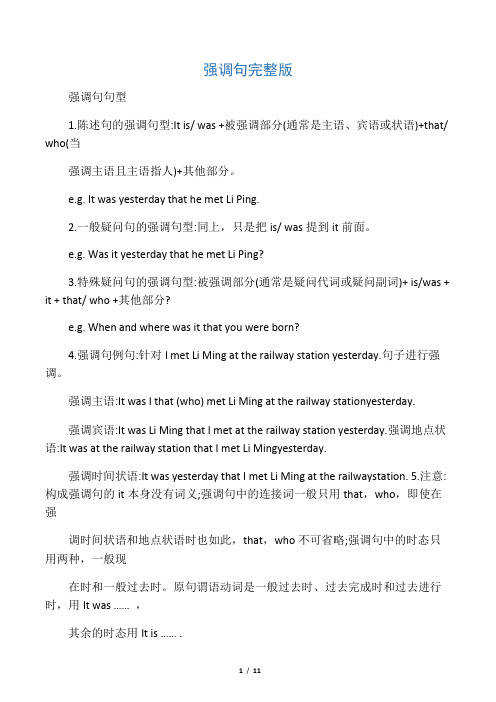
强调句完整版强调句句型1.陈述句的强调句型:It is/ was +被强调部分(通常是主语、宾语或状语)+that/ who(当强调主语且主语指人)+其他部分。
e.g. It was yesterday that he met Li Ping.2.一般疑问句的强调句型:同上,只是把is/ was提到it前面。
e.g. Was it yesterday that he met Li Ping?3.特殊疑问句的强调句型:被强调部分(通常是疑问代词或疑问副词)+ is/was + it + that/ who +其他部分?e.g. When and where was it that you were born?4.强调句例句:针对I met Li Ming at the railway station yesterday.句子进行强调。
强调主语:It was I that (who) met Li Ming at the railway stationyesterday.强调宾语:It was Li Ming that I met at the railway station yesterday.强调地点状语:It was at the railway station that I met Li Mingyesterday.强调时间状语:It was yesterday that I met Li Ming at the railwaystation. 5.注意:构成强调句的it本身没有词义;强调句中的连接词一般只用that,who,即使在强调时间状语和地点状语时也如此,that,who不可省略;强调句中的时态只用两种,一般现在时和一般过去时。
原句谓语动词是一般过去时、过去完成时和过去进行时,用It was …… ,其余的时态用It is …… .14, (2004,上海)Why! I have nothing to confess. __ you want me to say?A, What is it that B, What it is thatC, How is it that D, How it is that15, (2005,山东) -__ that he managed to get the information?-Oh, a friend of his helped him.A, Where was it B, What was itC, How was it D, Why was it二、not … until … 句型的强调句1.句型为:It is/ was not until +被强调部分+ that +其他部分e.g.普通句:He didn't go to bed until/ till his wife came back.强调句:It was not until his wife came back that he went to bed.2.注意:此句型只用until,不用till.但如果不是强调句型,till,until可通用;因为句型中It is/ was not …… 已经是否定句了,that后面的从句要用肯定句,切勿再用否定句了。
强调句典型例句100句
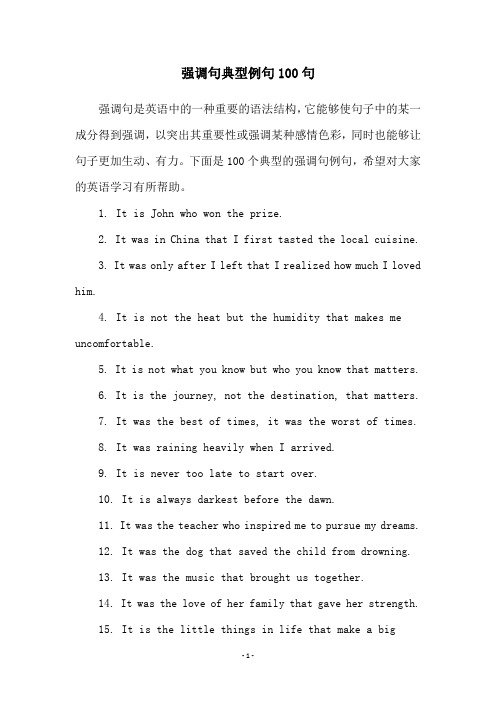
强调句典型例句100句强调句是英语中的一种重要的语法结构,它能够使句子中的某一成分得到强调,以突出其重要性或强调某种感情色彩,同时也能够让句子更加生动、有力。
下面是100个典型的强调句例句,希望对大家的英语学习有所帮助。
1. It is John who won the prize.2. It was in China that I first tasted the local cuisine.3. It was only after I left that I realized how much I loved him.4. It is not the heat but the humidity that makes me uncomfortable.5. It is not what you know but who you know that matters.6. It is the journey, not the destination, that matters.7. It was the best of times, it was the worst of times.8. It was raining heavily when I arrived.9. It is never too late to start over.10. It is always darkest before the dawn.11. It was the teacher who inspired me to pursue my dreams.12. It was the dog that saved the child from drowning.13. It was the music that brought us together.14. It was the love of her family that gave her strength.15. It is the little things in life that make a bigdifference.16. It is the thought that counts.17. It was the kindness of strangers that helped me througha difficult time.18. It was the beauty of the sunset that took my breath away.19. It was the silence that spoke volumes.20. It was the courage of the firefighters that saved the building from burning down.21. It is the people, not the place, that make a home.22. It is the memories that we cherish most.23. It was the laughter that echoed through the room.24. It was the tears that flowed freely.25. It is the truth that will set you free.26. It is the lie that will come back to haunt you.27. It was the fear that paralyzed me.28. It was the anger that consumed me.29. It is the happiness that we all strive for.30. It is the sadness that we all try to avoid.31. It is the fear of the unknown that holds us back.32. It was the excitement that filled the air.33. It was the disappointment that hung heavy in the room.34. It is the hope that keeps us going.35. It is the despair that can bring us down.36. It was the confidence that led to his success.37. It was the doubt that held him back.38. It is the love that makes life worth living.39. It is the hate that can tear us apart.40. It was the joy that filled her heart.41. It was the sorrow that weighed her down.42. It is the courage to take risks that leads to great rewards.43. It is the fear of failure that holds us back.44. It was the determination that led to his victory.45. It was the lack of motivation that led to his defeat.46. It is the perseverance that leads to success.47. It is the giving up that leads to failure.48. It is the hard work that leads to achievement.49. It is the laziness that leads to mediocrity.50. It was the confidence that made her shine.51. It was the shyness that made her fade into the background.52. It is the intelligence that leads to success.53. It is the ignorance that leads to failure.54. It was the honesty that earned him respect.55. It was the dishonesty that earned him scorn.56. It is the loyalty that builds strong relationships.57. It is the betrayal that tears them apart.58. It was the generosity that made her beloved.59. It was the selfishness that made her despised.60. It is the forgiveness that heals wounds.61. It is the grudge that festers and grows.62. It was the respect that he showed that earned him admiration.63. It was the disrespect that he showed that earned him contempt.64. It is the humility that makes us human.65. It is the arrogance that makes us insufferable.66. It was the gratitude that she expressed that touched their hearts.67. It was the ingratitude that she showed that turned them away.68. It is the patience that leads to understanding.69. It is the impatience that leads to frustration.70. It was the understanding that led to reconciliation.71. It was the misunderstanding that led to conflict.72. It is the communication that leads to resolution.73. It is the lack of communication that leads to misunderstanding.74. It was the teamwork that led to success.75. It was the individualism that led to failure.76. It is the cooperation that leads to progress.77. It is the competition that leads to stagnation.78. It was the harmony that made them a great team.79. It was the discord that tore them apart.80. It is the balance that leads to a healthy life.81. It is the imbalance that leads to an unhealthy life.82. It was the moderation that led to his longevity.83. It was the excess that led to his downfall.84. It is the simplicity that leads to happiness.85. It is the complexity that leads to stress.86. It was the beauty of the natural world that inspired him.87. It was the ugliness of the city that depressed him.88. It is the peace of the countryside that soothes the soul.89. It is the chaos of the city that frazzles the nerves.90. It was the serenity of the ocean that calmed her.91. It was the turbulence of the storm that frightened her.92. It is the freedom of expression that is a fundamental human right.93. It is the censorship of expression that is a violation of human rights.94. It was the diversity of cultures that enriched his life.95. It was the homogeneity of cultures that bored him.96. It is the tolerance of differences that leads to harmony.97. It is the intolerance of differences that leads to conflict.98. It was the acceptance of change that led to progress.99. It was the resistance to change that led to stagnation. 100. It is the adaptability that leads to survival.以上是100个典型的强调句例句,通过这些例句的学习,我们可以更好地理解强调句的语法结构和用法,同时也能够提高自己的英语表达能力。
强调句的用法及练习
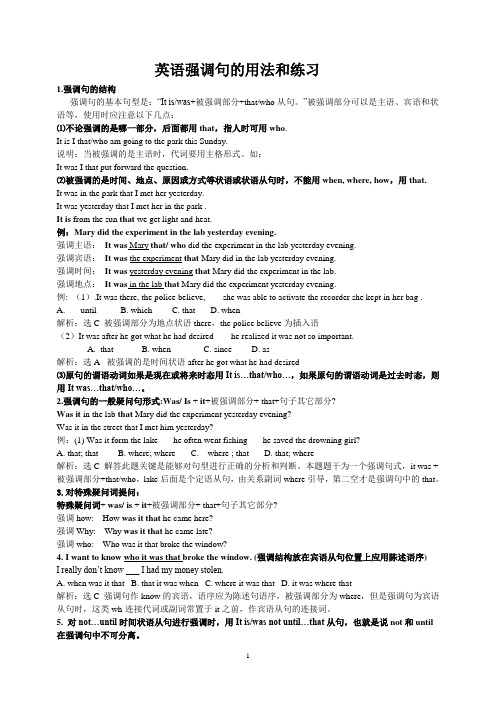
英语强调句的用法和练习1.强调句的结构强调句的基本句型是:“It is/was+被强调部分+that/who从句。
”被强调部分可以是主语、宾语和状语等,使用时应注意以下几点:⑴不论强调的是哪一部分,后面都用that,指人时可用who.It is I that/who am going to the park this Sunday.说明:当被强调的是主语时,代词要用主格形式。
如:It was I that put forward the question.⑵被强调的是时间、地点、原因或方式等状语或状语从句时,不能用when, where, how,用that.It was in the park that I met her yesterday.It was yesterday that I met her in the park .It is from the sun that we get light and heat.例:Mary did the experiment in the lab yesterday evening.强调主语:It was Mary that/ who did the experiment in the lab yesterday evening.强调宾语:It was the experiment that Mary did in the lab yesterday evening.强调时间:It was yesterday evening that Mary did the experiment in the lab.强调地点:It was in the lab that Mary did the experiment yesterday evening.例: (1).It was there, the police believe, ___ she was able to activate the recorder she kept in her bag .A. untilB. whichC. thatD. when解析:选C 被强调部分为地点状语there,the police believe为插入语(2)It was after he got what he had desired ___ he realized it was not so important.A. thatB. whenC. sinceD. as解析:选A 被强调的是时间状语after he got what he had desired⑶原句的谓语动词如果是现在或将来时态用It is…that/who…,如果原句的谓语动词是过去时态,则用It was…that/who…。
强调句典型例句100句

强调句典型例句100句强调句是英语中非常重要的语法结构之一,它可以用来强调某个句子成分的重要性或者突出某个观点的重要性。
在英语中,强调句常常使用倒装句和强调副词来表达。
下面是100个典型的强调句例句,希望对大家的英语学习有所帮助。
1. It was John who stole the money.(强调主语)2. It is the teacher who makes the difference in education.(强调主语)3. It was in Paris where I met my wife.(强调地点状语)4. It is only after we have lost everything that we are free to do anything.(强调时间状语)5. It was not until I met him that I realized how muchI loved him.(强调时间状语)6. It was in the library that I found the book.(强调地点状语)7. It was on the top of the mountain that we saw the sunrise.(强调地点状语)8. It was not until I got home that I realized I had left my keys in the office.(强调时间状语)9. It was only when I saw the movie that I understood the book.(强调时间状语)10. It is the little things that count.(强调宾语)11. It is the people who make the difference.(强调主语)12. It was the best party I have ever been to.(强调宾语)13. It is not what you say, but how you say it.(强调宾语)14. It is not what you know, but who you know.(强调宾语)15. It was not the answer I was looking for.(强调宾语)16. It was the worst day of my life.(强调宾语)17. It is not until you lose everything that yourealize what you had.(强调宾语)18. It is only when you are alone that you can truly be yourself.(强调宾语)19. It is not how much you have, but how much you enjoy that makes you happy.(强调宾语)20. It was the most beautiful sunset I have ever seen.(强调宾语)21. It is not what you do, but how you do it that matters.(强调宾语)22. It was the most delicious meal I have ever had.(强调宾语)23. It is not what you wear, but how you wear it that makes you stylish.(强调宾语)24. It was the most exciting game I have ever watched.(强调宾语)25. It is not where you go, but who you go with that makes the trip memorable.(强调宾语)26. It was the scariest movie I have ever seen.(强调宾语)27. It is not what you have, but what you give that defines you.(强调宾语)28. It was the longest journey I have ever taken.(强调宾语)29. It is not what you achieve, but how you achieve it that matters.(强调宾语)30. It was the most challenging project I have ever worked on.(强调宾语)31. It is not what you say, but what you do that counts.(强调宾语)32. It was the most difficult decision I have ever made.(强调宾语)33. It is not what you have, but what you do with whatyou have that matters.(强调宾语)34. It was the most important lesson I have ever learned.(强调宾语)35. It is not what you have, but who you are that matters.(强调宾语)36. It was the most inspiring speech I have ever heard.(强调宾语)37. It is not what you take, but what you leave behind that counts.(强调宾语)38. It was the most memorable vacation I have ever had.(强调宾语)39. It is not what you gain, but what you give up that defines you.(强调宾语)40. It was the most romantic evening I have ever had.(强调宾语)41. It is not what you earn, but how you earn it that matters.(强调宾语)42. It was the most satisfying meal I have ever had.(强调宾语)43. It is not what you receive, but what you give that makes you rich.(强调宾语)44. It was the most touching story I have ever heard.(强调宾语)45. It is not what you have, but what you do that defines you.(强调宾语)46. It was the most wonderful experience I have ever had.(强调宾语)47. It is not what you get, but what you give that matters.(强调宾语)48. It was the most amazing sight I have ever seen.(强调宾语)49. It is not what you have, but what you share that makes you happy.(强调宾语)50. It was the most beautiful wedding I have ever attended.(强调宾语)51. It is not what you believe, but how you act on your beliefs that matters.(强调宾语)52. It was the most breathtaking view I have ever seen.(强调宾语)53. It is not what you have, but what you do with what you have that counts.(强调宾语)54. It was the most challenging obstacle I have ever faced.(强调宾语)55. It is not what you know, but how you apply what youknow that matters.(强调宾语)56. It was the most difficult test I have ever taken.(强调宾语)57. It is not what you say, but how you say it that matters.(强调宾语)58. It was the most exciting adventure I have ever had.(强调宾语)59. It is not what you have, but who you are that counts.(强调宾语)60. It was the most important decision I have ever made.(强调宾语)61. It is not what you do, but why you do it that matters.(强调宾语)62. It was the most memorable moment I have ever experienced.(强调宾语)63. It is not what you have, but what you give that makes you rich.(强调宾语)64. It was the most rewarding experience I have ever had.(强调宾语)65. It is not what you say, but what you do that defines you.(强调宾语)66. It was the most satisfying job I have ever had.(强调宾语)67. It is not what you have, but what you do with it that counts.(强调宾语)68. It was the most surprising news I have ever heard.(强调宾语)69. It is not what you have, but what you do that makes you happy.(强调宾语)70. It was the most unusual experience I have ever had.(强调宾语)71. It is not what you have, but what you do that matters.(强调宾语)72. It was the most wonderful feeling I have ever experienced.(强调宾语)73. It is not what you have, but what you do with what you have that counts.(强调宾语)74. It was the most beautiful painting I have ever seen.(强调宾语)75. It is not what you have, but what you do that defines you.(强调宾语)76. It was the most challenging task I have ever undertaken.(强调宾语)77. It is not what you have, but what you do that makesa difference.(强调宾语)78. It was the most exciting event I have ever attended.(强调宾语)79. It is not what you have, but what you do that makes you successful.(强调宾语)80. It was the most important experience I have ever had.(强调宾语)81. It is not what you have, but what you do that makes you great.(强调宾语)82. It was the most meaningful conversation I have ever had.(强调宾语)83. It is not what you have, but what you give that makes you valuable.(强调宾语)84. It was the most powerful speech I have ever heard.(强调宾语)85. It is not what you have, but what you do that makes you extraordinary.(强调宾语)86. It was the most satisfying experience I have ever had.(强调宾语)87. It is not what you have, but what you do that makes you special.(强调宾语)88. It was the most significant event I have ever beena part of.(强调宾语)89. It is not what you have, but what you do that makes you unique.(强调宾语)90. It was the most valuable lesson I have ever learned.(强调宾语)91. It is not what you have, but what you do that makes you important.(强调宾语)92. It was the most challenging experience I have ever had.(强调宾语)93. It is not what you have, but what you do that makes you admirable.(强调宾语)94. It was the most enriching experience I have ever had.(强调宾语)95. It is not what you have, but what you do that makes you successful.(强调宾语)96. It was the most fulfilling experience I have ever had.(强调宾语)97. It is not what you have, but what you do that makes you happy.(强调宾语)98. It was the most life-changing experience I have ever had.(强调宾语)99. It is not what you have, but what you do that makesyou fulfilled.(强调宾语)100. It was the most transformational experience I have ever had.(强调宾语)总之,强调句在英语中是一种非常重要的语法结构,可以用来强调句子成分的重要性或者突出某个观点的重要性。
- 1、下载文档前请自行甄别文档内容的完整性,平台不提供额外的编辑、内容补充、找答案等附加服务。
- 2、"仅部分预览"的文档,不可在线预览部分如存在完整性等问题,可反馈申请退款(可完整预览的文档不适用该条件!)。
- 3、如文档侵犯您的权益,请联系客服反馈,我们会尽快为您处理(人工客服工作时间:9:00-18:30)。
强调句一、强调句句型1.陈述句的强调句型:Itis/was+被强调部分(通常是主语、宾语或状语)+that/who(当强调主语且主语指人)+其他部分。
Itwasonthepartythathemetoneofhisoldfriends.2.一般疑问句的强调句型:同上,只是把is/was提到it前面。
Was it on the party that heme tone of his old friends?3.特殊疑问句的强调句型:被强调部分(通常是疑问代词或疑问副词)+is/was+it+that/who +其他部分?When and where was it that you were born? Imetthefilmstar—JackieChanatBeijingAirportyesterday.强调主语:It was I(that/who)met the film star—JackieChanatBeijingAirportyesterday.强调宾语:Itwasthefilmstar—JackieChanthat/whoImetatBeijingAirportyesterday.强调地点状语:ItwasatBeijingAirportthatImetthefilmstar—JackieChanyesterday.强调时间状语:ItwasyesterdaythatImetthefilmstar—JackieChanatBeijingAirport.注意:构成强调句的it本身没有词义;强调句中的连接词一般只用that和who,即使在强调时间状语和地点状语时也如此,that和who不可省略;强调句中的时态通常用两种:一般现在时和一般过去时。
原句谓语动词是一般过去时、过去完成时和过去进行时,用Itwas...,其余的时态用Itis...二、not...until...句型的强调句1.句型为:Itis/wasnotuntil+被强调部分+that+其他部分ItwasnotuntilthelastoperationwasfinishedthatBethuneleftthebattlehospital.注意:此句型只用until,不用till。
但如果不是强调句型,till和until可通用。
因为句型中Itis/wasnot...已经是否定句了,that后面的从句要用肯定句,切勿再用否定句。
三、谓语动词的强调1.Itis/was...that...结构不能强调谓语,如果需要强调谓语时,用助动词do/does或did。
Dositdown.Hedidwritetoyoulastweek.Dobecarefulwhenyoucrossthestreet.注意:此种强调只用do/does和did,没有别的形式;过去时用did,后面的谓语动词用原形。
省略句为了使讲话和行文简洁,句中某些成分有时可省略。
省略可分以下几种情况:一、简单句中的省略1.省略主语:祈使句中主语通常省略。
其他省略主语的用法多限于少数现成的说法。
(I)Thankyouforyourhelp.(I)Seeyoutomorrow.(It)Doesn'tmatter.2.省略主谓语或主谓语的一部分。
(Thereis)Nosmoking.(Isthere)Anythingwrong?Why(doyou)notsayhellotohim?3.不定式的省略(1)使役动词let,make,have及感官动词see,watch,hear,notice,observe,feel,lookat,listento等后面作宾语补足的不定式要省去to,但在被动句时应加上to。
Isawtheboyfallfromthetree.Theboywasseentofallfromthetree.2)mean,try,want,afford,decide,refuse,wish,like,need,wouldlike,wouldlove...等后面接不定式作宾语时,省略作宾语的不定式。
只保留不定式符号to,但如果该宾语是动词be或完成时态的不定式时,则需在to后加上be或have。
—Areyougoingthere?—Yes,I'dliketo(gothere).—Areyouanengineer?—No,butIwanttobe(anengineer).3)tell,warn,order,advise,ask,expect等动词后接不定式作宾补时常省略不定式的宾语补足语。
Thestudentswanttoenterthelab,butthemonitoradvisesthemnotto(enterthelab).4)两个或两个以上的动词不定式并列在一起由and/or连接时,第1个不定式带to,后面的不定式可省去to。
但如表示对比(照)等,则不省略to。
Herjobistotakecareofthechildrenand(to)washclothes.It'sbettertolaughthantocry.5)主(宾)语补足语中的tobe往往省略。
Hewasthought(tobe)thecleverestboyinthegroup.6)特殊结构中的省略wouldsooner,hadbetter,donothingbut,havenothingtodobut,there'snothingtodobut,can'thelpbut,rather than等后的不定式的符号to常省略。
Hewouldsoonerdiethansurrender.I'dratherlookafterthebabythanwashdishes.7)主语部分有一个表“做”的do的各种形式时,表语不定式常省略“to”。
WhatIreallywanttodois(to)gotothecinema.4.省略表语—Are you thirsty?—Yes,Iam(thirsty).5.同时省略几个成分Let'smeetatthesameplaceas(wemet)yesterday.—Haveyoufinishedyourwork?—(Ihave)Not(finishedmywork)yet.二、并列句中的省略两个并列分句中,后一个分句常省略与前一分句中相同的部分。
Myfatherisadoctorandmymother(is)anurse.Istudyatcollegeandmysister(studies)athighschool.三、主从复合句中的省略1.主句中有一些成分被省略。
(I'm)Sorrytohearthatyouareill.(Itisa)Pitythathemissedsuchagoodchance.2.从句的省略(1)宾语从句以which,when,where,how和why引导的宾语从句在其谓语与主句谓语相同时,可省略全部谓语,甚至主语也省略,仅保留一个wh-词。
ShewillgotoBeijing,butIdon'tknowwhen(shewillgotoBeijing.)(2)状语从句在时间、地点、让步、方式、条件状语从句中,如果主语与主句主语一致,或者主语是it,那么动词be及其主语通常可省略。
常见的有以下几种:时间状语从句:Becarefulwhen(youare)crossingthestreet.条件状语从句:Hewon'tgotothepartyunless(heis)invited.比较状语从句:Countrymusictodayremainsmuchthesameas(itwas)before.让步状语从句:Whether(itis)rightorwrong,hisopinionshouldbepaidattentionto.注意:though和as引导让步状语从句时,通常从句要倒装。
从句倒装时,如果从句的表语是可数名词单数,将名词提前时,名词前面的冠词a/an须省略。
Childas/thoughheis,heknowsmuchaboutthesociety.=Thoughheisachild,heknowsmuchaboutthesociety.注意:有些由if构成的省略结构,已属固定短语,如ifany,ifnecessary,ifpossible,ifnot,ifso等。
Ifnecessary,ringmeathome.—Hemaybebusy.—Ifso,I'llcalllater.Ifnot,canIseehimnow?(3)修饰名词way的限制性定语从句常省略inwhich或that。
Isthiswayyoutalktoyourparents?(4)强调句Itis/was...that...,当强调疑问句时,that常可省略。
Whywasit(that)youweretenminuteslate?用so或not时切不可用it或that代替。
—Ishecomingbacktonight?—Ithinkso.—Ishefeelingbettertoday?—I'mafraidnot.这种用法常见的有:Howso?Whyso?Isthatso?Ihopeso.Hesaidso.及Isupposenot.Ibelievednot.Ihopenot等。
(但Idon'tthinkso比Ithinknot更常用)。
四、连词that的省略1.宾语从句中常省略连词that,但也有不能省略的情况(参看“名词性从句”等有关部分)。
2.在定语从句中,that在从句中作宾语时可省略。
3.引导主语从句、同位语从句等的连词that一般不可省略。
在表语从句中偶尔可省略。
在近五年的高考试卷中强调句、省略句已经成为高考热点。
命题者加大了对句子结构复杂程度和知识面的考查,同时注重考查知识之间的交叉。
这就要求学生在复习和备考中注意总结,全面把握,深入研究。
具体把握强调句以下四大考点:1.考查强调句式的基本结构2.考查含有“not...until...”句型的强调句式3.考查强调句式的疑问句4.考查强调句式的正确判断省略是高考英语考试大纲要求掌握的语法项目之一,虽然不是每年必考项目,但不少省份有所涉及。
从命题的趋势来看,更侧重考查省略在交际中的功能,考查语法知识间的交叉使用。
高考真题探究(2006—2011年)【2011四川卷15】Wasitonalonelyisland______hewassavedonemonthaftertheboatwentdown? A.whereB.thatC.whichD.what【答案】B【考点】考查强调句。
